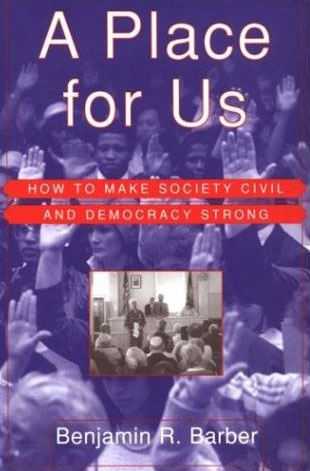"Our world, on the threshold of the millennium, grows crowded: too many people, too much anarchy, too many wars, too much dependency. Plagued by the effects of this crowding — conflict, alienation, the colonization of our everyday lives by bureaucracy and markets, the erosion of traditional work, a scarcity of meaningful jobs — we look, often in vain, for hospitable spaces to live in, for common ground where we can arbitrate our differences or survive them with civility, for places where we can govern ourselves in common without surrendering our plural natures to the singular addictions of commerce and consumerism. A place for us: that is all we seek. A place that allows full expression to the 'you' and 'me,' the 'we' of our commonalty, a place where that abstract 'we' discloses the traces that lead back to you and me.
"Walt Whitman followed the traces from the great American abstraction back to its palpably human constituency:
"O I see flashing that this America is only you and me,
Its power, weapons, testimony, are you and me,
It’s crimes, lies, thefts, defections, are you and me,
Its Congress is you and me, the officers, capitols, armies,
ships, are you and me….
Natural and artificial are you and me,
Freedom, language, poems, employments are you and me,
Past, present, future, are you and me.
"I dare not shirk any part of myself,
Not any part of America good or bad….
"In an ideal civic architecture of free nations, the space that accommodates the mutuality of 'you and me' is civil society. The very phrase suggests an independent domain of free social life where neither governments nor private markets are sovereign; a realm we create for ourselves through associated common action in families, clans, churches, and communities; a 'third sector' (the other two are the state and the market) that mediates between our specific individuality as economic producers and consumers and our abstract collectivity as members of a sovereign people. The philosopher Michael Walzer’s spare language calls civil society 'the space of uncoerced human association and also the set of relational networks — formed for the sake of family, faith, interest and ideology -- that fill this space.' Trouble is, the relational networks of family and faith that fill the space of uncoerced association are themselves often coercive. This paradox is at the heart of the distinctions among types of civil society I will propose.
"Like all political constructs, civil society is not singular in meaning or ideological intent. It has been many things and played many roles in the many different epochs and places. In despotic communist and fascist states, it has been an imagined future land of liberty and as such has given dissidents and rebels a high-octane engine of revolt. In centralized states, it has been imagined land of ancient municipal liberties and as such has given conservatives a blunt instrument with which to resist state activism. (Thus did Alexis de Tocqueville, in his The Ancient Regime and the French Revolution, appeal to the traditional freedom of France’s once sovereign regional parlements when he surveyed the destruction wrought not only by the Revolution but by the centralizing tendencies of the Bourbon kings.) Liberals, too, have used civil society as a caution against government gargantuanism. When in his 1996 State of the Union address President Bill Clinton proclaimed the end of the era of big government, he gave a certain progressive legitimacy to a twenty-year-old conservative campaign against government in general. But being against government does not necessarily produce a program on behalf of civil society."
"Among radical economic conservatives, the call to dismantle government has been accompanied by an appeal to markets. Though they are private, rapacious, and uncivil, markets have become for such conservatives a synonym for civil society. People are understandably impatient with metastasizing government bureaucracy, but when they succumb to the logic that proposes markets in its stead, they risk rationalizing a wholesale privatization that leaves those in need dependent on the uncertain mercies of the market and robs those who seek cooperative democratic solutions to their problems of the public instruments they need to discover and execute a common will. Big government has always been an ally of the little guy, and downsizing it has generally been a recipe for upgrading the power of private-sector monopolies. Schoolroom bullies are forever questioning the legitimacy of hallway monitors. The recent abolition in the United States of “welfare as we know it,” conspired in by Democrats and Republicans alike, is a monument to an infectious fear of government that puts those most in need most at risk."
